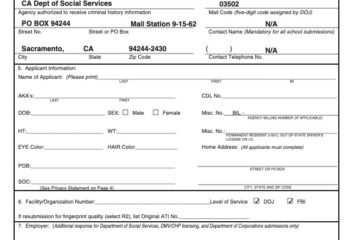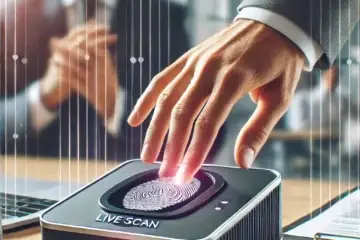When applying for immigration to another country, obtaining an FBI background check is a key step in the process. This document helps verify that the applicant does not have a criminal record in the United States. For many countries, the FBI background check alone is not sufficient—it must also be authenticated with an apostille to ensure it is legally recognized in the destination country. Understanding how to obtain the background check, how to request an apostille, and the authentication requirements for immigration can help avoid delays and complications in the immigration process.
What Is an FBI Background Check?
An FBI background check, or Identity History Summary Check, is a report issued by the Federal Bureau of Investigation that details an individual’s criminal history based on fingerprint records. The background check includes any arrests, charges, or convictions in the United States. If no criminal record exists, the report will confirm that the individual has a clean history.
For immigration purposes, an FBI background check is often required by foreign governments to ensure that applicants do not pose security risks. It is essential for visa applications, residency requests, citizenship applications, and sometimes work permits.
Why Is an FBI Background Check Required for Immigration?
Foreign governments typically require an FBI background check as part of the immigration process to verify that the applicant has no significant criminal history. This helps them ensure that individuals seeking entry into their country meet the legal and security criteria set by the nation’s immigration laws.
An FBI background check is crucial for different types of immigration applications, including work visas, family reunification visas, student visas, and permanent residency applications. Some countries may also require this report for adoption cases, marriage-based immigration, or naturalization procedures.
Obtaining the FBI Background Check
Step 1: Apply for the Background Check
To request an FBI background check, you will need to submit a fingerprint card, a completed application form, and the required payment. There are two main ways to apply for the check:
- Direct Submission to the FBI: This method requires sending the fingerprint card, application form, and payment directly to the FBI Criminal Justice Information Services (CJIS) Division. Processing through this route usually takes two to four weeks.
- Using an FBI-Approved Channeler: Channelers are private companies authorized by the FBI to process background checks more quickly. This method can reduce processing time to 24 to 72 hours but may not be accepted for all immigration applications. Some countries only accept background checks obtained directly from the FBI.
The fingerprinting process is a critical part of the background check. Fingerprints must be submitted on an FD-258 fingerprint card, which can be obtained at local police stations, fingerprinting agencies, or through live scan fingerprinting centers. Live scan technology captures your fingerprints electronically and submits them directly to the FBI, reducing the risk of poor-quality prints and ensuring accuracy.
Step 2: Receive the FBI Background Check Report
After your fingerprints are processed, the FBI will issue your background check report. The results will be sent in two formats:
- Electronic format (PDF): Typically delivered through email or a secure portal, this format is often suitable for online submission to immigration authorities.
- Physical copy: This is mailed via the United States Postal Service. If required, you may need to submit the physical copy to the destination country’s immigration authority.
Obtaining an Apostille for Immigration
Once you have your FBI background check, it will need to be authenticated before it can be used in another country. For countries that are part of the Hague Apostille Convention, an apostille is required to verify the document’s legitimacy.
Step 3: Apply for the Apostille
The apostille is a certification that verifies the authenticity of the document and ensures it is legally recognized abroad. To obtain an apostille for your FBI background check, follow these steps:
- Submit the Original Document: The original FBI background check must be sent to the appropriate authority for apostille processing.
- Choose the Correct Authority: If your document is a state-issued document (such as a state background check or birth certificate), the apostille must be obtained from the Secretary of State in the state where the document was issued. For federal documents like an FBI background check, the apostille is obtained from the U.S. Department of State in Washington, D.C.
- Complete the Apostille Request Form (DS-4194): This form is required for processing an apostille. It includes details about the document, the requestor, and the destination country where the document will be used.
- Submit Payment: Payment for the apostille processing fee is required when submitting your request. The fee varies depending on the issuing authority, but it generally ranges from $10 to $25 per document.
- Wait for Processing: The apostille process typically takes two to four weeks, though expedited services are available for an additional fee. If you are using a third-party service, they may be able to reduce processing time to 1-3 days.
Step 4: Receive the Apostille
Once processed, the apostille will be attached to your FBI background check. The apostille ensures the document is authenticated and valid for use in countries that are members of the Hague Apostille Convention.
For countries that do not accept apostilles (non-Hague countries), the document must go through embassy or consular legalization.
Embassy or Consular Legalization for Non-Hague Countries
If your destination country does not accept apostilles, you will need to go through a more complex process called embassy legalization. This process involves:
- Certification by the U.S. Department of State: The document must first be authenticated by the U.S. Department of State.
- Legalization at the Embassy or Consulate: After the document has been certified by the U.S. Department of State, it must be submitted to the embassy or consulate of the destination country for final legalization.
- Translation Requirements: Some countries also require translations of the FBI background check and apostille. Certified translators must perform these translations and provide notarized statements confirming accuracy.
Common Mistakes to Avoid When Requesting an FBI Background Check and Apostille for Immigration
One of the most common mistakes is waiting too long to request the FBI background check and apostille, causing delays in the immigration process. It is recommended to start the process months in advance, as the entire process can take several weeks.
Another mistake is submitting incorrect or incomplete documentation. Ensure you provide properly certified copies of the required documents and verify the submission requirements for both the FBI background check and apostille before submission.
It is also important to confirm whether your destination country requires an apostille or embassy legalization and whether a translation is needed. Failing to adhere to these requirements can lead to rejection or delays in processing your immigration application.
Final Steps Before Submitting to Immigration Authorities
Before submitting your apostilled FBI background check to immigration authorities, verify the following:
- Check Time Limits: Some immigration offices require documents to be issued within a specific time frame, such as three to six months.
- Translation Requirements: Ensure all necessary translations are completed and notarized if required by the destination country.
- Keep Copies: Make extra copies of the FBI background check and apostille in case additional copies are requested.
Conclusion
An FBI background check and apostille are essential for immigration applications. The process involves applying for the background check, getting it authenticated with an apostille, and ensuring it meets the requirements of the destination country. By starting early, verifying requirements, and avoiding common mistakes, applicants can avoid delays and ensure smooth processing for immigration.



0 Comments